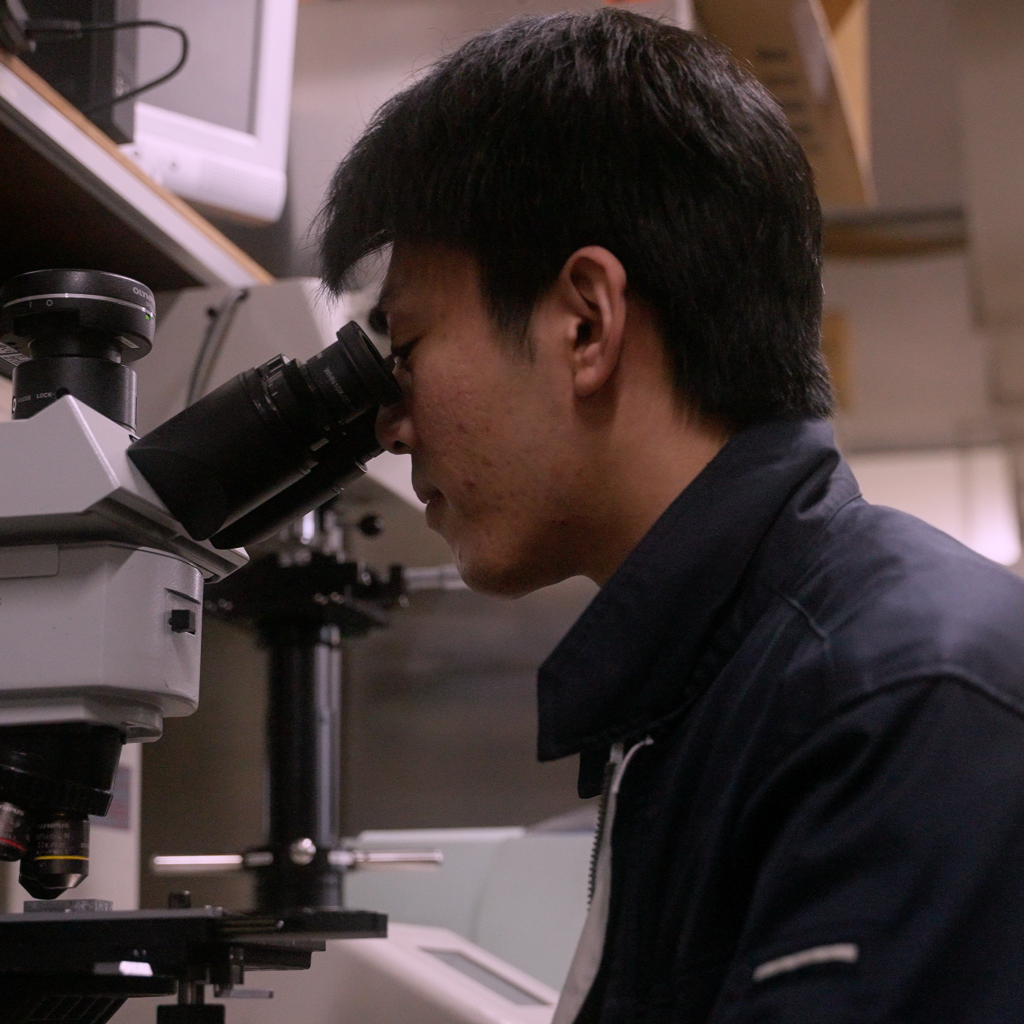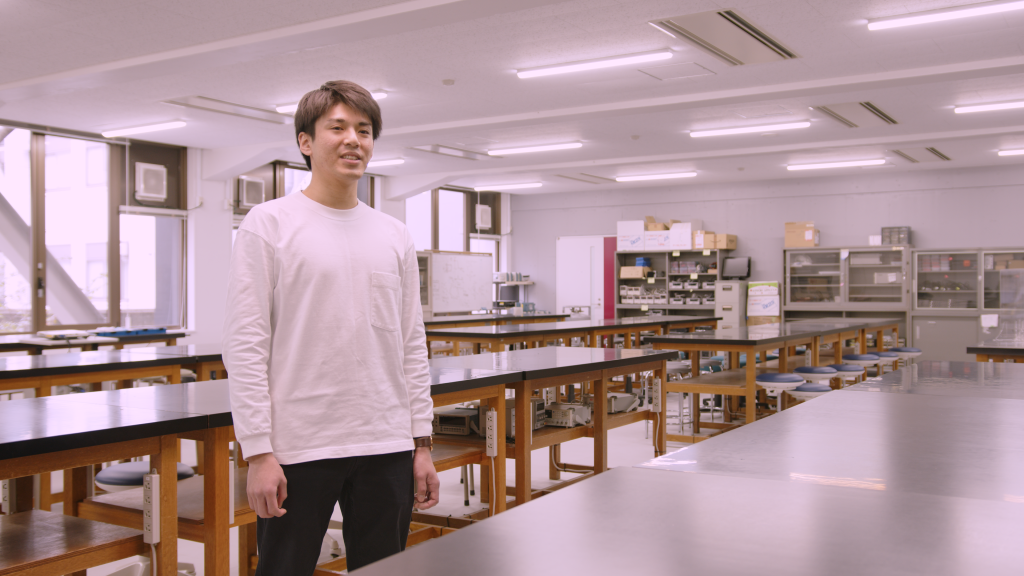A world of possibilities lies just beyond the door of knowledge

“Until I entered university, I held the opinion that only concepts that have been proven by science could be considered correct,” says Ryo Moriya, a first-year student at the Graduate School of Science and Technology.
Being exposed to diverse values and studies on a campus that integrates the humanities and science has led to new insights that have helped him to open his mind to new concepts and grow into a more well-rounded person.
Working with others to discover that there can be more than one right answer
When deciding on which school to attend, I was attracted to Sophia University as it has both liberal arts and science departments on the same campus, and the opportunity to study alongside a diverse group of students was appealing to me.
Since entering Sophia, I’ve met many new and interesting people through classes and the archery club, which has been a great way for me to broaden my perspectives on a wide variety of topics, and I now have a renowned appreciation for the importance of diversity.
To be honest, until I entered university, I held the opinion that only concepts that have been proven by science could be considered correct, but after meeting and interacting with various types of people who had different ways of thinking than I did, I discovered that there are many different ways to form ideas, and that often there is no one single right answer.
When I speak with students in other faculties, I’m often surprised to discover that they see things that I myself have never noticed. Recently, I was talking to a law student about the relationship between the height of buildings and the laws that govern them, which is a connection that I had never made before. I’ve noticed that, even if another student is the same age as me and attends the same university, their perspective can be completely different from my own, which makes for a diverse learning environment.
In these moments, I am reminded that I shouldn’t restrict myself to thinking within the confines of science. Learning to be more open-minded is one of the areas in which I grew the most during my four years at university.
Accepting that I don’t know everything allows ample room for growth

One of the best parts about being a student in the Faculty of Science and Technology is that I have the flexibility to study a wide variety of subjects.
Since every faculty is located on the same campus, it’s easy to take classes that are outside my main area of focus but are still relevant to my learning goals. Being able to study mathematics from a management perspective and learn about international efforts to address environmental issues has given me a complete education and made me a more well-rounded student.
Going further, I was also able to take a class on “Studies in Christian Humanism” that focused on the relationship between science and philosophy from a religious and historical perspective. The way these topics connected was fascinating and gave me a new, ethical perspective that I could draw upon in my scientific studies.
When you learn to consider topics from multiple perspectives, you begin to realize that seemingly unrelated subjects are connected in ways that you may have never noticed. This is perhaps what most distinguishes high school from university, as the topics available to you are seemingly endless. Studying so many different subjects has been a huge benefit to me, as I’ve come to realize how uninformed I was on many topics, and there is so much more for me to continue learning.
I’ve been able to come to these realizations about myself as a student, despite not having a clear idea of what I wanted to study when I first entered university.
Thankfully, the Department of Engineering and Applied Sciences (EAS) allows students to study mechanics, electricity, and physics comprehensively, so I was able to find what I really wanted my area of focus to be. Each professor in the department is a specialist in their own field, which provides us students with relevant real-world experience that we can draw from in our own research.
I also put a lot of effort into studying English, since being able to read English papers helps me keep up with the latest information and trends in my field of study. Being able to communicate with international students in my laboratories is another great way for me to practice my language skills, and it allows me to make connections that are rewarding both personally and professionally.
Thanks to the stimulating learning environment at Sophia, my awareness and attitude toward education has changed for the better.
Taking an active role in leading research to pave the way for the next generation of engineers
When I graduated from university, I decided to join graduate school as I wanted to gain experience in building on what I had learned in my undergraduate classes by partaking in academic presentations.
An academic presentation is when you present your research results in front of professionals and experts who specialize in the same field of research. At the end of the presentation there is an evaluation, so the motivation to do well is high.
These are situations that not even working professionals get to take part in very often, and it’s a unique experience that really feels like you are witnessing the progress of academia. This feeling is amplified when I am doing research in my laboratory, as there is a device we use that is one-of-a-kind, and the data we collect using it is used all around the world. It’s so exciting to be on the cutting edge of research and contribute to new discoveries every day.
In my laboratory, we are researching a phenomenon called “hydrogen embrittlement of iron.” Iron has always been an essential element for the survival of humans, a fact that expands outside of its life-sustaining characteristics when looking at modern infrastructure.
The research I am conducting in collaboration with a major manufacturer is about making iron and steel more widely available for use in applications like automobile and bridge construction. I take my presentations very seriously, as I am seen as a representative of the company I am working in collaboration with, and I want to ensure that I am a reliable spokesperson. Since the stakes are so high, it can be nerve-wracking when presenting to experts, but it’s a very rewarding feeling when I do well in these situations.
Today, I feel that it’s not enough for an engineer to only design for the sake of design. The ideology of creating products that are simply affordable or useful just doesn’t cut it anymore. Nowadays, engineers must be able to take important topics like the global environment and production efficiency into account when designing.
As I look to break into the professional world, I strongly believe that, for science majors to make a difference in the world, they must acquire a wide range of knowledge, including subjects that fall under the humanities.
I am very grateful for the environment at Sophia University that allowed me to gain such a versatile education, as it has set me up for a successful career. In the future, I hope to become an engineer who can confidently inspire a younger generation to pursue their dreams.
※Please note that the content of this article is subject as of February 2022